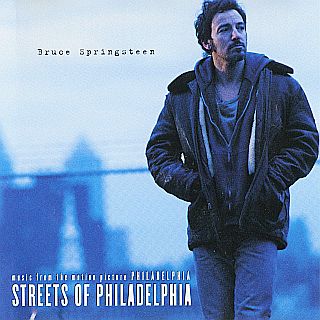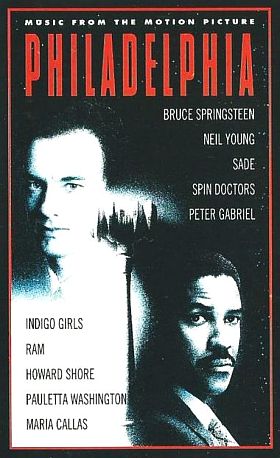Music Player
“Streets of Philadelphia”
(scroll down for lyrics)
Springsteen’s song, “The Streets of Philadelphia,” is a haunting, powerful tune that captures the pain and tragedy of AIDS — the immune system disease formally known as “acquired immune deficiency syndrome.”
In the film, the song is used in the opening credits, played over street scenes of Philadelphia as the story opens with Hanks as rising young lawyer Andy Beckett working at a highly-regarded private law firm.
But the power of Springsteen’s song, which fit the movie well, went beyond the film’s airing. For some, the music later helped recall particular movie scenes, and for others, their own experiences with AIDS victims. In its day, the film, and the “Streets of Philadelphia” song, helped provide a much-needed and more sympathetic understanding of AIDS victims and the epidemic. Tom Hanks received an Oscar for his performance in the film, while the Springsteen song won an Oscar, a Golden Globe, and four Grammys.
Released in early 1994 as a single, and also on the movie soundtrack, the “Streets of Philadelphia” became a top-of-the-charts hit, peaking at No.9 on the U.S. Billboard Hot 100 and reaching No.1 in several European countries including France, Germany, Ireland and Norway. Along with the soundtrack, sales of the song exceeded one million copies worldwide. There was also a music video made for the song in which Springsteen is featured walking through the streets of Philadelphia with a short appearance by the Tom Hanks character as well.
|
“Streets of Philadelphia” I was bruised and battered and I walked the avenue till my legs felt like stone Ain’t no angel gonna greet me The night has fallen, I’m lyin’ awake |
The song itself has spare musical sound, using a single drum beat at its opening, then merging with an organ/synthesizer, Springsteen’s vocals, and some nice, light backing by a male chorus. The lyrics and arrangement do the rest, making for quite a powerful rendition, especially with lines, such as: “Ain’t no angel gonna greet me, it’s just you and I my friend.” Or, “I walked a thousand miles just to slip this skin…”
Helping the song’s exposure through 1994 and early 1995 were three Springsteen performances during high-profile, prime-time TV shows: the Hollywood Academy Awards in March 1994; the MTV Music Video Awards in September 1994; and the Grammy Awards in March 1995. Tens of millions saw the song’s performance on those shows.
By then, millions had also seen the film and “Streets of Philadelphia” had also racked up various music awards: a Golden Globe for Best Song; an Oscar for Best Song; four Grammy awards (Best Song, Best Rock Song, Best Male Rock Vocal Performance, Best Song Written for a Motion Picture); and finally, an MTV Video Music Award for Best Video from a Film.
Critics generally had high praise for the film, some noting the effects of its music. Jonathan Demme, the director (Melvin and Howard, 1980; The Silence of the Lambs, 1991), had a particular strategy in mind regarding the film’s music. Demme wanted people not familiar with AIDS to come to the film, and felt that rock musicians contributing to its score might help bring an audience that would not ordinarily come to film about a gay man dying of AIDS.
Demme had first thought about using a song like Neil Young’s “Southern Man” for the film’s opening sequence. But he later decided not to use Young’s music at the opening, and kept looking for other possibilities. However, Young would write and perform another quite moving song used at the film’s ending wake scene and gathering of friends. More on that later.
Still needing an opening song, Demme asked Springsteen to do it. Working from his home studio in New Jersey in the summer of 1993, Springsteen produced a piece using lyrics he had previously written about the death of one of his friends. Not quite satisfied with what he came up with, and finding a rough fit with a rock beat, Springsteen nevertheless sent an early, unfinished demo to Demme for a listen. Demme liked what he heard and the piece soon became part of the film. (Trailer for the film follows below for those who may not be familiar with its subject and story line).
“Streets of Philadelphia” is perhaps the most memorable tune that came from the film. But Demme also used other music throughout the movie to enhance and imprint its message. In one quite memorable scene, Hanks’ Beckett character is in the advanced stages of AIDS, but is preparing for his court appearance in a meeting at his home with his attorney, played by Denzel Washington.
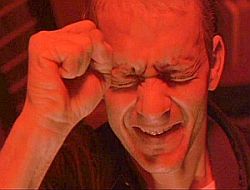
AIDS victim, Andy Beckett, in the emotional grasp of "La Mama Morta", interpreting its meaning.
“…Washington isn’t an opera fan, but as the music plays and Hanks talks over it, passionately explaining it, Washington undergoes a conversion of the soul. What he sees, finally, is a man who loves life and does not want to leave it. And then the action cuts to Washington’s home, late at night, as he stares sleeplessly into the darkness, and we understand what he is feeling.”
At the end of the film, too, sometime after the Hanks character has succumbed to AIDS, there is another powerful and moving scene that is amplified by its music. The setting is at a gathering of friends at a private residence paying their respects to Andrew Beckett’s family and friends for their loss, captured by the video clip below.
As the camera pans the room of guests, friends are shown arriving and greeting one another, some embracing family members for their loss. After a time of panning around the room showing the guests, the camera then begins to slowly zoom in on a video monitor that is playing a loop of home movies with the Hanks’ character as a child. In the background is the voice of Neil Young, accompanied only by a spare piano. Young sings plaintively in what has been described as his “lost-little-boy” voice. He sings a gentle song with lyrics that cover a lifetime — from childhood and sexual discovery ( “When we were boys and girls / And the secrets came unfurled”), to the grown man’s final fight with AIDS and his community ( “City of brotherly love / Place I call home / Don’t turn your back on me / I don’t want to be alone”).
The Young song — titled “Philadelphia” — was also nominated for the Best Song Oscar in the same year with “Streets of Philadelphia,” which took the prize. Demme generally won praise for “book-ending” his film with the two moving, contemporary songs rather than using the more traditional classical scoring.
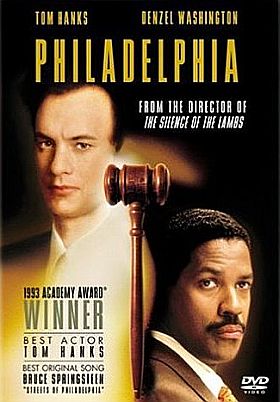
DVD cover for the 1993-94 film, 'Philadelphia,' starring Tom Hanks as an AIDS-afflicted Philadelphia attorney who is wrongfully fired and hires lawyer Denzel Washington to sue his former employer. Click for DVD.
Additional stories on film music at this website include: “The Saddest Song,” a story which tracks the history and impact of Samuel Barber’s “Adagio for Strings” and the powerful use of that music in film scores for Elephant Man (1980), Platoon (1986), and other films; “Philadelphia Morning, 1976-77″, a story about an underrated but highly effective song from Bill Conti’s popular score for the first Rocky film; and Carly Simon’s rousing “Let the River Run,” the theme song for the 1988 film, Working Girl.
Other stories at this website exploring the use of music in film include: Mickey & Sylvia’s 1957 song, “Love is Strange” and The Contours’ 1962 song, “Do You Love Me?” (both used in the 1987 film, Dirty Dancing); and the Righteous Brothers’ songs “You’ve Lost That Lovin` Feelin`” used in Top Gun (1986), and “Unchained Melody,” used in Ghost (1990).
Thanks for visiting – and if you like what you find here, please make a donation to help support the research and writing at this website. Thank you. – Jack Doyle
|
Please Support Thank You |
_________________________________
Date Posted: 10 August 2009
Last Update: 1 December 2018
Comments to: jdoyle@pophistorydig.com
Article Citation:
Jack Doyle, “Streets of Philadelphia, 1993-1994,”
PopHistoryDig.com, August 10, 2009.
_________________________________
Sources, Links & Additional Information
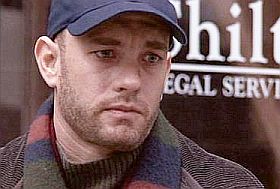 Tom Hanks in scene from 1993 film, "Philadelphia." |
Bill Higgins, “‘Philadelphia’ Moves the Masses,” Los Angeles Times, December 16, 1993, p. E-2.
Janet Maslin, “Philadelphia; Tom Hanks as AIDS Victim Who Fights the Establishment,” New York Times, Wednesday, December 22, 1993, p. C-15.
Steve Hochman, “Touching the Heart of ‘Philadelphia’,” Los Angeles Times, January 2, 1994, p. 60.
Stephen Holden, “Eloquent Movies With Eloquent Soundtracks,” New York Times, January 30, 1994.
Steve Hochman, “The Boss? Neil Young? Are We in the Right Place?,” Los Angeles Times, March 20, 1994, p. 27.
Robert Hilburn, “Springsteen Closes Rock Music Gap: For the First Time in 40 Years of Rock ‘n’ Roll, Hollywood Gives the Best Song Oscar to a Pure Rock Songwriter for ‘Streets of Philadelphia’,” Los Angeles Times, March 22, 1994, p. F-2.
Robert Hilburn, “Bruce Springsteen’s ‘Streets of Philadelphia’ Heads Our Critic’s Top 10 List at Midyear,” Los Angeles Times, July 2, 1994, p. F-1.
“Streets of Philadelphia” and “Philadelphia,” Wikipedia.org.
“Streets Of Philadelphia, by Bruce Spring- steen,” Song Facts.com.
Rob Kirkpatrick, The Words and Music of Bruce Springsteen, The Praeger Singer-Songwriter Collection, Westport, Connecticut, 2007, 198 pp.
Philadelphia Trailer on You Tube (shown above).
Philadelphia Movie Ending on You Tube with Neil Young song “Philadelphia.” (shown above).
Neil Young song “Philadelphia”on You Tube separately without ending film sequence.
See You Tube also for other short film clip selections from Philadelphia, such as “Tom Hanks in Philadelphia.”
Roger Ebert, Film Review, “Philadelphia,” SunTimes.com, January 14, 1994.
